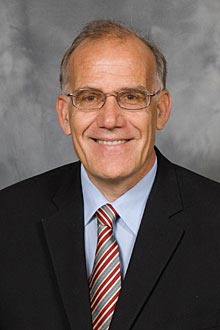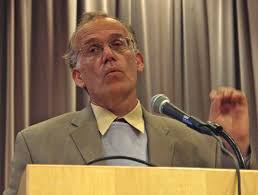Victor Davis Hanson
last updated: February 12, 2016
Please note: The Militarist Monitor neither represents nor endorses any of the individuals or groups profiled on this site.

Affiliations
- Hoover Institution:Fellow
- Claremont Institute:Former Fellow
- Bradley Foundation: Member, Board of Directors
Business
- Tribune Media Services: Columnist
- University of California: Former Instructor
- U.S. Naval Academy: Former Visiting Professor
Education
- University of California-Santa Barbara: B.A.
- Stanford University: Ph.D., Classics
Once described as “a blood-and-guts classicist and one of Vice President Dick Cheney‘s favorite dinner guests,”[1] Victor Davis Hanson is a fellow at the Hoover Institution, the hawkish Stanford University-based think tank that, alongside the American Enterprise Institute, served as one of the George W. Bush administration’s key recruiting grounds (though Hanson has not served in the government).[2] Like Donald Kagan, Hanson is a neoconservative writer who specializes in ancient history and has a penchant for finding parallels between current events and antiquity—for example, comparing the Iraq War to the Peloponnesian War.[3]
A syndicated columnist for Tribune Media Services, Hanson’s articles are regularly published by rightist outlets, including the National Review and Bill Kristol’s Weekly Standard. Hanson’s columns cover everything from economics and foreign policy to the culture wars and domestic politics.[4] On foreign policy, Hanson has been a vociferous proponent of an expansive “war on terror,” a supporter of U.S. military intervention in the Middle East, and a critic of diplomacy-oriented approaches to international crises.

Hawkish Track Record
After Bush’s May 2008 speech to the Israeli Knesset in which he compared negotiating with Iran to the appeasement of Hitler—a comparison criticized by then-presidential candidate Barack Obama, whom many saw as the target of Bush’s comments—Hanson came to the defense of Bush, who was criticized for using the speech to influence electoral politics. Hanson opined that the president was using an “expansive notion” of appeasement “when he elaborated on his ‘negotiate with terrorists and radicals’ line, with the proviso of futility—namely that such talking assumed an ‘ingenious argument will persuade them they have been wrong all along.’” Arguing that nothing in Bush’s speech was “inaccurate, inflammatory, or hypocritical,” Hanson concluded, “Whether Barack Obama believes he was a target of the president’s rhetoric, or whether he would engage in appeasement, hinges on whether his overeagerness to talk without preconditions to the world’s thugs and rogues would persist in the face of unpleasant facts.”[5]
Hanson also strongly opposed the negotiations that led to the July 2015 historic nuclear deal between Iran and six major world powers. After the deal was struck, he claimed it would “make the world a much more dangerous place.”[6]
In December 2007, Hanson assessed the war in Iraq and the diminishing domestic support for it. Though he conceded that, “Our military is too small for our assumed current geopolitical responsibilities,” Hanson’s support for the invasion is equaled by his frustration with those who have stopped supporting it. “We now argue over the requisite number of troops necessary in the aftermath of Iraq. Few, however, complain about the three-week victory of March and April 2003, in which U.S. military and coalition forces, at very little loss, destroyed the Baathist government and removed Saddam Hussein with about 250,000 troops,” he wrote. “Someone did something right, though exactly who and what is now forgotten.”[7]
War on Terror
Hanson, a 2007 recipient of the National Humanities Medal,[8] has bemoaned what he claims is the weakening will in the United States to fight terrorism. Arguing that “we still censor ourselves in fears of terrorist threats,” Hanson criticized the State Department for “advising its officials to avoid perfectly descriptive terms for our enemies like ‘jihadist’ and ‘Islamo-fascist’ in favor of vague terms like ‘violent extremist’ or ‘terrorist’—as if we could just as easily be fighting Basque separatists.” He concluded, “After years of learning how to fight an unfamiliar war in Afghanistan and Iraq, and to protect us at home, we are finally getting most things right. But if our soldiers and intelligence agencies have learned how to win, our politically correct diplomats and the American consumer haven’t—and are doing as much at home to empower radical Islam as those on the front lines are to defeat it.”[9]
In a December 2015 article, Hanson denounced President Obama’s approach to confronting ISIS. He wrote: “When the president pontificates on the evils of Guantánamo Bay, rather than worries over the subsequent careers of terrorists who were released from the detention facility, does that encourage or discourage ISIS?”[10]
He added: “Unfortunately, there is scant evidence from military history in general to suggest that human nature operates in the manner that the administration assumes, and in particular none at all that the administration’s approach to ISIS has lost the terrorists support.”[11]
Hanson has also claimed that terrorist attacks in the West might cease if terrorist groups were referred to as “radical Muslims.” He wrote in a November 2015 piece: “To preserve our sense of progressive utopianism, we seem willing to offer up a few hundred innocents each year to radical Islam. The slaughter might cease in a few years if we were to name our enemies as radical Muslims and make them aware that it could well be suicidal for their cause to kill a Westerner.”[12]
Other Work
Hanson has also written book reviews for the neoconservative flagship magazineCommentary, often providing enthusiastic appraisals of the work of his fellow neoconservatives. In his review of Midge Decter’s 2003 Rumsfeld: A Personal Portrait, an admiring biography of former Pentagon chief Donald Rumsfeld, Hanson opined that “what Midge Decter’s biography reminds us is that we need this seventy-one-year-old veteran far more than he needs us.”[13]
Hanson also reviewed Douglas Feith’s account of his time working under Paul Wolfowitz and Rumsfeld in the Defense Department, War and Decision: Inside the Pentagon at the Dawn of the War on Terrorism, a book that some critics called an attempt by the former undersecretary of defense to exempt himself from U.S. failures in Iraq.[14] But to Hanson, the book was a “dispassionate counterresponse” to critics who have blamed civilian policymakers like Feith and Wolfowitz. “Feith is not interested in getting even, but rather in systematically exploring the accuracy of the entire pessimistic narrative that has grown up about Iraq. Although he does not question every detail, he subjects enough of the narrative to cross-examination to show that it is largely a myth. His tools are understated irony and extensive documentation—some 600 footnotes and dozens of reprinted documents.”[15]
Hanson maintains a blog called “Works and Days” on the rightist pajamasmedia.com. In an entry shortly after Obama’s presidential win, Hanson briefly praised the president-elect for waging an “often brilliant (if not shrewdly stealthy) campaign.” Regarding the support Obama received from abroad, Hanson wrote: “why would we wish governments currently composed of radical Palestinians, Iranians, Venezuelans, North Koreans, Syrians, or Russians to like or admire us? While we would wish not to gratuitously excite their ire, their empathy toward us should make us worried not relieved. Who cares whether the royal House of Saud is happy over the election, or those in the Iranian parliament or the activists of Hezbollah?”[16]
Hanson’s is a former fellow of the conservative Claremont Institute and past classics instructor at the University of California-Santa Barbara.[17] According to his Hoover bio, Hanson has received a number of awards and distinctions, including being named a National Endowment for the Humanities fellow at the Center for Advanced Studies in the Behavioral Sciences, Stanford, California (1992), an Alexander Onassis Fellow (2001), and alumnus of the year of the University of California, Santa Cruz (2002).[18]
In 2002, Hanson was awarded the Eric Breindel Award for opinion journalism, given annually by Eric Breindel Foundation to a conservative writer. Established in 1999 with funding from Rupert Murdoch’s News Corporation, other recipients have included Bret Stephens of the Wall Street Journal; Max Boot; Claudia Rosette of the Foundation for Defense of Democracies; and Mark Steyn, author of a number of right-wing screeds, including American Along: The End of the World as We Know It, published by Regnery in 2008.[19]
Hanson is the author of several books, including The Wars of the Ancient Greeks (1999);The Soul of Battle (1999);Carnage and Culture (2001); andAn Autumn of War (2002).
One of Hanson’s more recent books is the 2005 A War Like No Other: How the Athenians and Spartans Fought the Peloponnesian War, a retelling of Thucydides’ classic account of that war. Despite receiving high praise (the New York Times put it on its list of most notable books of 2006), some reviewers found Hanson’s efforts to find parallels between the Peloponnesian War and the Iraq War absurd. Writing in the American Conservative, Gary Blecher faulted Hanson for calling the 9/11 terrorist attacks “our Peloponnesian War.” Blecher writes, “9/11 didn’t trigger a lethal plague, didn’t kill a huge chunk of our population, didn’t cause the fall of our country, and didn’t involve naval war, sieges, pitched battle, or in fact any of the strategies of the Peloponnesian War. The only similarity I can see is that they were both bad scenes.”[20]Hanson’s depiction of the United States as a contemporary version of ancient Athens has “huge logical problems,” wrote Blecher. “For starters, how does this fit into the Hanson project of using ancient Greece to make Iraq look good? If Athens equals America, as Hanson keeps saying, then we’ve got a problem: Athens lost. So if Hanson’s neocon readers buy the parallel, they should be wetting their pants and preparing to convert to Islam.”[21]
